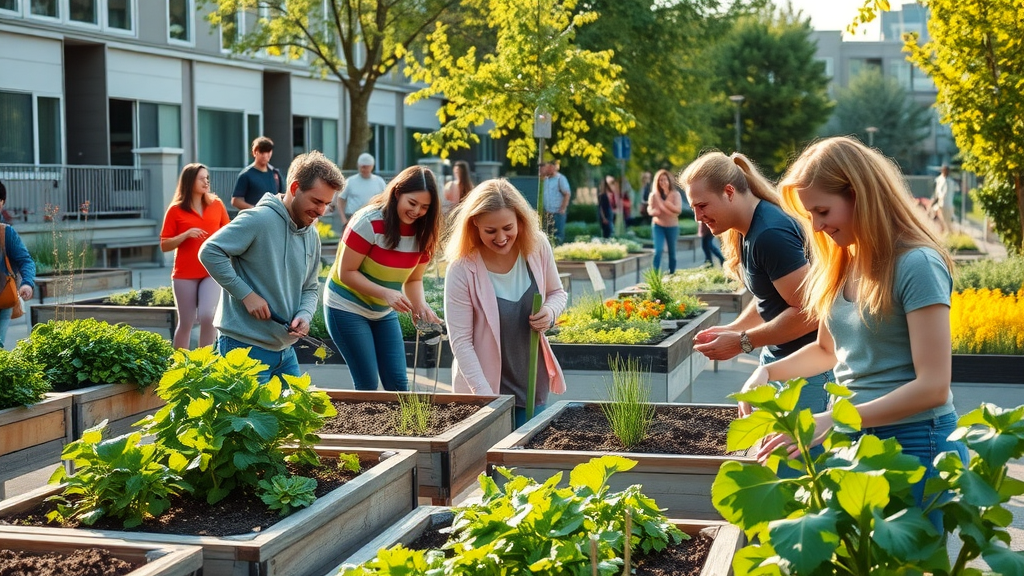"In the heart of Vancouver, fresh produce isn’t just found in grocery stores—it bursts from balconies, laneways, and shared urban parcels, fueling a new movement: urban gardening." Imagine strolling through a bustling Vancouver neighbourhood when the scent of basil and tomatoes drifts from the balconies overhead. Below, a narrow laneway bursts with rows of kale and carrots, while neighbors joyfully trade tools, tips, and stories beneath the early morning sun. Urban gardening in Vancouver isn’t a trend; it’s a citywide awakening—where anyone, regardless of age, living space, or experience, can help transform concrete jungles into nourishing oases. This is the city’s answer to pressing food security concerns, a movement strengthening community roots, fighting climate change, and providing vibrant, fresh food right where we live. In this article, you’ll uncover how urban gardening can reshape Vancouver’s food culture and learn actionable ways to grow your own garden plot. We’ll spotlight innovations from city beet farm and community garden champions, demystify city guidelines, and guide you through joining the revolution. If you’re ready to cultivate abundance and connection on your own doorstep, read on—the next local harvest could be yours. Why Urban Gardening Vancouver Matters Now Personal story of witnessing a community garden blossom in East Vancouver How urban gardening empowers residents to combat food insecurity The environmental and health benefits of growing your own urban farm Several years ago, I watched a vacant lot in East Vancouver transform into a thriving community garden . Plot by plot, neighbors worked together under the guidance of an experienced city farmer , digging, planting, and nurturing the soil. Soon, the space exploded into color: tomatoes gleamed on trellises, fruit trees offered shade, and raised beds overflowed with local produce. It wasn’t just the plants that flourished—so did the friendships, mutual support, and sense of pride among all involved. Urban gardening in Vancouver is much more than a leisure activity. It’s a vital response to the city’s unique food system challenges. As food insecurity and rising prices touch more households, personal and community gardens deliver reliable pathways to fresh food and food sovereignty. By growing food right where we live, neighbors can access healthy ingredients, even where grocery stores are far away or prices are increasing. This resilience is echoed throughout Vancouver’s network of urban farms and community gardens , each carving out a solution in the heart of the city. Beyond food access, urban gardening Vancouver has far-reaching environmental and health impacts. Each time a resident chooses to garden, they’re cutting food miles, boosting local biodiversity, and helping to combat climate change . Homegrown greens and root vegetables foster cleaner air and stronger neighborhood ties—benefits that can’t be measured at supermarket checkouts. The city’s fertile experiment is living proof that the future of food is local, green, and empowering. What You'll Gain Embracing Urban Gardening in Metro Vancouver Understand the essentials of urban farming and how it shapes Vancouver’s food culture Connect with local produce initiatives and community gardens Learn key opinion insights on city beet, beet farm, and other urban farms When you start urban gardening in Vancouver, you gain far more than a harvest basket. You join a grassroots food systems revolution that’s shifting the way the city thinks about sustainability, nutrition, and community. Whether you dream of transforming a personal garden or collaborating on a larger community plot , you’ll learn urban farming essentials—from soil health and pest control to sustainable watering practices—crucial for anyone hoping to grow food year-round in diverse microclimates. Becoming part of Vancouver 's urban gardening also connects you directly with local produce initiatives like Fresh Roots and City Beet Farm . These organizations have reimagined city spaces as dynamic, productive landscapes. They run workshops, share seeds, and mentor new gardeners—making urban farming accessible for beginners and seasoned city farmers alike. If you’re working with a compact balcony or a small patio, you might find it helpful to explore some creative approaches for maximizing your harvest. Discovering efficient gardening hacks for small spaces can make a big difference in your urban farming success—check out these practical tips for transforming limited areas into lush, productive gardens at this guide to small-space gardening in urban environments . Finally, you’ll access invaluable opinion insights and community support. Projects such as beet farm internships and community supported agriculture introduce you to sustainable food systems thinking, help you build networks, and let you advocate for a greener, more resilient Vancouver. The skills, friendships, and rewards are as enduring as the soil they’re rooted in. Urban Gardening Vancouver: Real Stories from Urban Farms and Community Gardens Spotlight: City Beet and Beet Farm Contributions to Vancouver's Urban Gardening Case study: City Beet Farm’s adaptive growing techniques Personal perspectives from city farmer volunteers Few names resonate more in urban gardening Vancouver than City Beet Farm and their passionate team. Nestled between city homes, City Beet Farm’s micro- urban farm model stands as a template for adaptive growing in tight city spaces. Using raised beds, succession planting, and organic methods, they cater to Vancouver’s temperamental growing season. Their approach maximizes yield without an acre of land and proves that it’s possible to grow food intensively and sustainably in even the most compressed neighborhoods. Volunteers and CSA members share how joining City Beet has been transformative. “It’s not just that we pick beets and greens,” one volunteer explains. “We learn how to work together, share in the triumphs and setbacks, and eat the food we’ve all helped to nurture.” These personal stories highlight how a beet farm can serve as both a local food asset and a hub for building practical urban farming skills. City Beet Farm’s collaborative attitude ripples through Vancouver’s urban food scene, inspiring new city farmers and connecting city dwellers with food they helped grow. As a living laboratory, it keeps refining tools and models that other urban gardens and city farms can adopt across the city, making fresh and local produce truly accessible. The Role of Community Gardens in Fostering Urban Food Resilience Community impact stories from Fresh Roots and local produce champions How community gardens create connections among Vancouver residents Community gardens like those championed by Fresh Roots have far-reaching impacts on Vancouver residents. At the heart of almost every garden plot is a story: children learning to plant lettuce seeds for the first time, elders sharing ancestral growing knowledge, and neighbors coming together after work to tend communal beds. Fresh Roots, for example, has built powerful educational programs, inviting youth and volunteers to participate directly in the urban farming process. These community gardens serve a dual purpose. They boost food security and access to local produce in areas sometimes overlooked by traditional food systems. At the same time, they spark friendships and foster a sense of safety and connection—a “village green” in the midst of busy city lives. As volunteers nurture their garden plots , they’re also cultivating social ties, resilience, and hope. Through these shared gardening experiences, the lines between giving and receiving become blurred. Those who teach may just as often learn, and each harvest brings renewed gratitude. This spirit of reciprocity and support is fundamental to making Vancouver’s urban food networks both resilient and inclusive. Comparing Urban Gardening Vancouver Initiatives: City Beet Farm vs. Fresh Roots vs. Community Gardens Initiative Name Location Focus Crop Community Impact Score Volunteer Opportunities City Beet Farm Mount Pleasant and Riley Park Beets, leafy greens High Yes (CSA, events) Fresh Roots Schoolyards, NE Vancouver Root veggies, salad greens Very High Yes (education, market) Community Gardens Collective Various city parks & neighborhoods Mixed produce Medium-High Yes (plots, workshops) Practical Guide: How to Start Urban Gardening Vancouver Projects Step-by-step: Choosing between a backyard patch or joining a community garden Navigating city of Vancouver urban farming guidelines Building your first container garden and joining city beet farm workshops Ready to embark on your urban gardening journey? Here’s how to get growing in Vancouver. First, assess your available space: a small balcony, a patch of backyard, or even the opportunity to join a community garden . Each option has its strengths. Personal gardens offer creative freedom, while community plots provide shared tools, guidance from experienced gardeners, and collective maintenance. Next, familiarize yourself with the City of Vancouver ’s urban farming guidelines. These resources outline what you can plant, water usage, and composting best practices—ensuring your efforts align with city sustainability plans and maximize your growing season. Many new gardeners find support by joining introductory workshops offered by City Beet Farm or Fresh Roots . These programs deliver hands-on mentoring, access to seeds and soil, and even the chance to swap produce with fellow enthusiasts. Don’t overlook container gardening for small spaces—Vancouver’s apartment dwellers have mastered this art, growing herbs, tomatoes, and root vegetables in pots and planters on balconies and patios. With a few simple containers, the right soil mix, and suitable crops, even a sunny window ledge can become a productive mini-farm. Engage your curiosity, start with quick-growing greens and herbs, and get advice at a local gardening event—your journey into city gardening begins with a single seed. Choosing the Right Urban Farm or Community Garden in Vancouver Assessing your goals: fresh produce, education, or community connections A guide to Vancouver’s top urban farms and gardens: urban farm, city beet, city farmer Selecting the best urban farming experience is about aligning your goals with Vancouver’s diverse offerings. Are you hoping to maximize your yield of local produce? Do you want to deepen your understanding of urban food systems through education? Or are you keenest on forming meaningful connections while getting your hands dirty? Your priorities will help you decide between a backyard patch, a plot in a dedicated urban farm like City Beet , or a classic community garden run by the Vancouver Community Gardens Collective. For those interested in expanding knowledge, programs like Fresh Roots’ educational initiatives and City Farmer compost demonstration gardens host regular events that demystify the art and science of growing food in city environments. Many urban farms, such as the beet farm internships at City Beet, emphasize practical skills while connecting you to other community supported agriculture (CSA) enthusiasts and local food leaders. To begin, research available options in your neighborhood or via the city’s urban gardening resources, and consider volunteering or attending an open house. Gardens such as those managed by the Vancouver Community Gardens Collective or City Farmer value inclusion—opening their doors to renters, new gardeners, and lifelong green thumbs alike. Opportunities abound for everyone eager to join this food and community movement. Top Urban Gardening Vancouver Resources: - Fresh Roots educational programs - City Farmer compost demonstration - Vancouver Community Gardens Collective events - Beet farm internship opportunities Local Produce and Urban Farming: The Impact on Vancouver’s Food Security How urban gardening Vancouver enhances access to local produce The ripple effect for local restaurants and city markets "Vancouver urban gardening doesn’t just grow food—it cultivates community, resilience, and hope in concrete jungles." Urban gardening in Vancouver BC is playing a pivotal role in increasing access to local produce, especially for communities experiencing food insecurity. By integrating urban farms and community gardens into neighborhoods, Vancouver has strengthened its food systems, reduced reliance on long-distance supply chains, and empowered residents to become both growers and eaters of the food asset their city creates. The ripple effect flows directly to local restaurants and bustling city markets. Chefs and market vendors increasingly prioritize fresh food sourced from urban farms, leveraging unique varieties and exceptional taste. This tightens the feedback loop between growers and buyers and supports a robust food economy that celebrates Vancouver’s microclimates and diverse population. For every crate of produce traded at a market stand, layers of connection—economic, environmental, and personal—grow deeper across the city. By foregrounding local food production, Vancouver is also buffering itself against global interruptions in food supply and price volatility. The collective pride of volunteers, garden plot tenders, and entrepreneurial city farmers ensures that fresh, healthy food is available to all, not just a privileged few. People Also Ask About Urban Gardening in Vancouver How can I start a community garden in Vancouver? Key steps: Organize community interest, liaise with City of Vancouver, select a site, secure funding, and follow urban gardening Vancouver best practices Starting a community garden in Vancouver begins with gathering local enthusiasm—rally neighbors, friends, or a community group who share your vision. Contact the City of Vancouver’s urban agriculture team to understand guidelines for site selection and legal requirements. Next, visit potential locations and assess their suitability for growing food, sunlight exposure, and water access. Pursue grants or crowdfunding to support your initial setup, and connect with local experts at City Farmer or the Vancouver Community Gardens Collective. Working collaboratively, plan your design, assign garden plots , and craft a maintenance rota that keeps everyone involved and invested. Begin with small, achievable goals and let the garden — and your community — blossom together. What are the best crops for urban gardening Vancouver's climate? Best options: leafy greens, root vegetables, herbs, and hardy berries suited for Vancouver’s microclimates and limited spaces Vancouver’s cool, wet winters and mild summers make it ideal for certain urban gardening crops. Fast-growing leafy greens like lettuce, arugula, and spinach thrive in both raised beds and containers. Root vegetables—carrots, beets (a favorite of City Beet Farm), and radishes—also excel, taking full advantage of the city’s extended growing season. Herbs such as mint, parsley, and chives are resilient in small spaces, while hardy berries (raspberries, strawberries) can be trained along fences or in hanging pots. Focus on varieties adapted to local conditions, and experiment with fruit trees or dwarf fruit cultivars if space permits. How do community gardens support Vancouver's sustainability goals? Community gardens reduce food miles, promote biodiversity, and support City of Vancouver climate initiatives Community gardens make meaningful contributions to sustainability across Vancouver. By producing food locally, they cut down “food miles”—the distance food travels from farm to fork—thus reducing carbon emissions. Each plot often features a diversity of crops, attracting pollinators, increasing urban biodiversity, and creating habitats for beneficial insects. Many gardens incorporate organic techniques and composting, which aligns with the city’s broader climate change and waste reduction goals. Collectively, these actions transform Vancouver into a model of urban resilience and greener city living. FAQs About Urban Gardening in Metro Vancouver Q: Are there city grants for urban farming projects in Vancouver? A: Yes, the City of Vancouver offers several micro-grant programs for community gardens and urban farming start-ups. These grants can help cover start-up costs, infrastructure, education programs, and more. Check the city’s official urban agriculture page for current opportunities and deadlines. Q: Can renters participate in urban gardening Vancouver? A: Absolutely—many rooftop, balcony, and communal garden spaces are open to non-landowners, especially those managed by community garden collectives. Renters can join waiting lists for garden plots or start container gardens on patios and shared balconies. Q: What is the difference between urban farms and community gardens? A: Urban farms typically operate as commercial or educational enterprises focused on growing food at scale or teaching sustainable practices. Community gardens are primarily designed for personal or shared use—giving individuals or groups a plot to grow food for their families or to share with neighbors. Why Urban Gardening Vancouver Is the Future of City Living Opinion piece: Urban gardening as a movement shaping the next generation of sustainable city dwellers Opportunities for the City of Vancouver to further support urban farming innovations The future of Vancouver is green, bustling, and resilient—powered by the hands and hopes of its residents. Urban gardening isn’t a passing fad: it’s a movement that empowers city dwellers to reclaim their food asset, fortify their local food systems, and inspire the next generation to eat, live, and thrive sustainably. Rooftop farms, vertical gardens, and micro-farm plots are revolutionizing the urban landscape, helping to fight climate change and fostering community supported agriculture. There’s ample opportunity for the City of Vancouver to expand its commitment to urban farming. By simplifying garden plot access, supporting innovative gardening technologies (hydroponics, rooftop solar integration), and championing food educator programs, the city can fortify its position as a North American leader in urban food security. As we look ahead, let’s envision a city where a farm is never more than a block away and where every balcony grows hope. With each container garden or rooftop harvest, Vancouver edges closer to becoming a self-sustaining, healthy, and welcoming place for all. Ready to Join Vancouver’s Urban Gardening Revolution? Call to action: Sign up for a local gardening workshop, volunteer at an urban farm, or advocate for community garden expansion in your neighbourhood. The tools for transformation are already in your hands. Join a workshop, volunteer at a local urban farm or community garden, or organize your own growing space. Every seed sown strengthens Vancouver’s urban ecosystem and brings us closer to a city that grows for everyone. Conclusion Start your own urban gardening project or connect with local farms today—grow food, cultivate community, and help shape a resilient Vancouver for the future. If you’re inspired to take your urban gardening journey even further, consider exploring broader strategies for sustainable city living. From eco-friendly home improvements to maximizing your space for both beauty and productivity, discover how you can create a truly stunning and sustainable urban oasis by visiting these innovative home and garden transformation ideas . Let your next step be one that elevates both your harvest and your home. Sources https://vancouver.ca/people-programs/community-gardens.aspx https://citybeetfarm.com/ https://freshroots.ca/ https://www.cityfarmer.eco/ https://vcgc.ca/ https://vancouver.ca/people-programs/urban-farming.aspx

 Add Row
Add Row  Add
Add 




 Add Row
Add Row  Add
Add 

Write A Comment